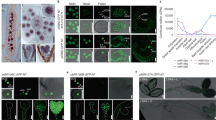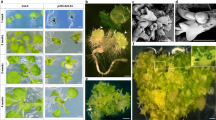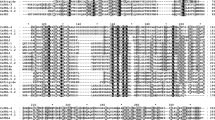Abstract
A systematic search for mutations in the flowering plant Arabidopsis thaliana that disrupt the spatial organization of the seedling by altering embryogenesis is described. Mutations in nine genes affect three different aspects of the body organization: apical–basal pattern along the single axis of polarity, radial pattern involving the primary tissues, and shape. The results suggest principles of pattern formation in the plant embryo. (This article was corrected on 21 October 2015.)
This is a preview of subscription content, access via your institution
Access options
Subscribe to this journal
Receive 51 print issues and online access
$199.00 per year
only $3.90 per issue
Buy this article
- Purchase on Springer Link
- Instant access to full article PDF
Prices may be subject to local taxes which are calculated during checkout
Similar content being viewed by others
References
Slack, J. From Egg to Embryo (Cambridge University Press, 1983).
Nüsslein-Volhard, C., Frohnhöfer, H.-G. & Lehmann, R. Science 238, 1675–1681 (1987).
Ingham, P. W. Nature 335, 25–34 (1988).
Redei, G. P. Bibliograph. Genet. 20, 1–151 (1970).
Meyerowitz, E. M. Cell 56, 163–169 (1989).
Takhtajan, A. L. Bot. Rev. 46, 225–359 (1980).
John, B. M. Embryology of Angiosperms (Springer, Berlin, 1984).
Steeves, T. A. & Sussex, I. Patterns in Plant Development (Cambridge University Press, 1989).
Jürgens, G. et al. Development 91 (Suppl. 1), 27–38 (1991).
Wolpert, L. J. theor. Biol. 25, 1–47 (1969).
Tykarska, T. Acta soc. bot. pol. 45, 2–15 (1976).
Tykarska, T. Acta soc. bot pol. 48, 391–421 (1979).
Schulz, R. & Jensen, W. A. Am. J. Bot. 55, 807–819 (1968).
Carpenter, R. & Coen, E. S. Genes Dev. 4, 1483–1493 (1990).
Bowman, J. L. et al. Development 112, 1–20 (1991).
Sachs, T. Development 91 (suppl. 1), 83–93 (1991).
Bruck, D. K. & Walker, D. B. Am. J. Bot. 72, 1602–1609 (1985).
Nüsslein-Volhard, C. & Wieschaus, E. Nature 287, 795–801 (1980).
Nüsslein-Volhard, C. et al. Wilhelm Roux Arch. dev. Biol. 193, 267–282 (1984).
Jürgens, G. et al. Wilhelm Roux Arch dev. Biol. 193, 283–295 (1984).
Wieschaus, E. et al. Wilhelm Roux Arch. dev. Biol. 193, 296–307 (1984).
Van der Meer, J. Drosoph. Inf. Serv. 52, 160 (1977).
Author information
Authors and Affiliations
Rights and permissions
About this article
Cite this article
Mayer, U., Ruiz, R., Berleth, T. et al. Mutations affecting body organization in the Arabidopsis embryo. Nature 353, 402–407 (1991). https://doi.org/10.1038/353402a0
Received:
Accepted:
Issue Date:
DOI: https://doi.org/10.1038/353402a0
This article is cited by
-
SWI2/SNF2 chromatin remodeling ATPases SPLAYED and BRAHMA control embryo development in rice
Plant Cell Reports (2022)
-
Functional dissection of the DORNRÖSCHEN-LIKE enhancer 2 during embryonic and phyllotactic patterning
Planta (2020)
-
Plant vascular development: mechanisms and environmental regulation
Cellular and Molecular Life Sciences (2020)
-
WUSCHEL-RELATED HOMEOBOX 2 is important for protoderm and suspensor development in the gymnosperm Norway spruce
BMC Plant Biology (2016)
-
Plastidic protein Cdf1 is essential in Arabidopsis embryogenesis
Planta (2014)
Comments
By submitting a comment you agree to abide by our Terms and Community Guidelines. If you find something abusive or that does not comply with our terms or guidelines please flag it as inappropriate.



